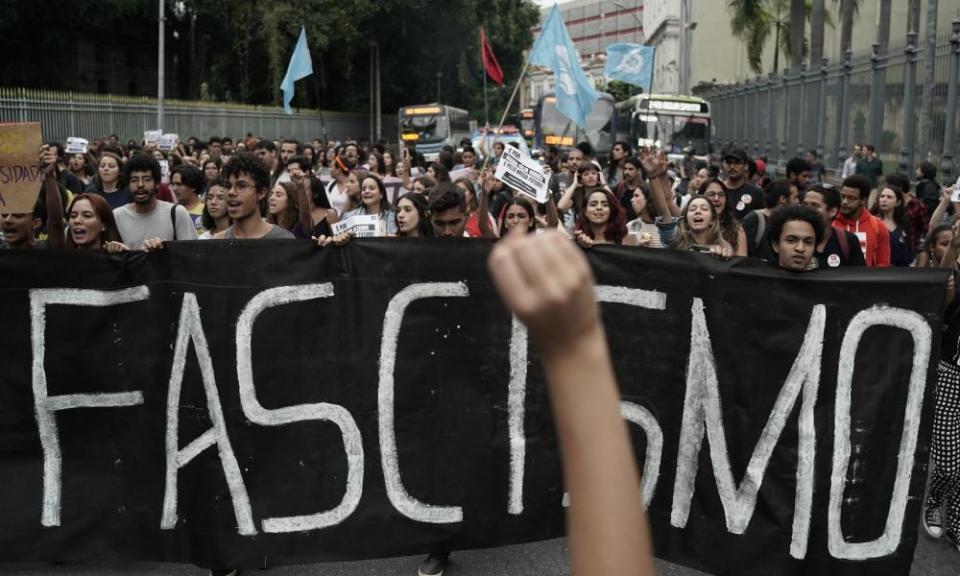Snitch on a teacher: Bolsonaro win sparks push against 'indoctrination'
A lawmaker from the party of ultra-right president-elect is urging students to denounce teachers who complain about his victory

A newly elected lawmaker from the party of Brazil’s ultra-rightwing president-elect, Jair Bolsonaro, has launched a campaign to encourage students to denounce teachers who complain about his victory.
The call came days after electoral authorities raided university events and classes about fascism on the pretext that they had broken electoral rules, and has raised fears of that Bolsonaro’s historic victory on Sunday will lead to ideological persecution.
Ana Campagnola, a history teacher, was elected to the state legislature in the southern state of Santa Catarina for Bolsonaro’s Social Liberal party in the election’s first round on 7 October.
On Sunday, she launched her campaign on Facebook, telling her 70,000 followers to be on the lookout for “indoctrinator teachers” who expressed outrage over Bolsonaro’s victory.
A WhatsApp number was provided for students to “film or record any party-political or ideological expressions that humiliate or offend your freedom of faith and conscience”.
In an interview with local radio, Campagnola said her phone had been running hot with denunciations. When one Facebook follower questioned the legality of filming in class, she warned: “Just behave properly and there is no reason to be scared, citizen.”
Campagnola could not immediately be reached for comment. Her Facebook describes her as “anti-snowflake, anti-Marxist and anti-feminist”. She hosts a YouTube channel and espouses the ideals of School Without Party – Escola Sem Partido – a rightwing campaign to outlaw “ideological, political or party” preferences from classrooms.
In September, a judge rejected a suit Campagnola had launched against the feminist professor supervising her master’s course in history at the State University of Santa Catarina. Campagnola had claimed £3,600 in damages for “intolerance” and “religious and political-ideological persecution”. She is appealing.
Her campaign came days after police and electoral officials visited dozens of universities across Brazil to curb what they said was election propaganda, which is not allowed in public buildings – even though some of the placards, banners and manifestos removed did not mention any candidate by name.
In one university near Rio de Janeiro, police removed a banner which included an anti-fascist symbol, while a student group at the Federal University of Grande Dourados in Mato Grosso do Sul state was ordered to stop an event billed as an “Open Class About Fascism” and student leaders were interviewed by police.
On Wednesday, police interrupted a class that Mário Brasil Xavier, a professor of social science at the State University of Pará, was holding in Igarapé-Açu.
Xavier told the Guardian students had asked if they could take photos of the slides he was using and he jokingly said, as long as you don’t use them to produce fake news.
Researchers have found that Bolsonaro’s supporters spread more fake news before the election than those of his leftist rival Fernando Haddad – an allegation that incensed his supporters.
One of Xavier’s students called her father, who arrived with three heavily armed police officers who interviewed the professor.
“One of the police said I was showing political preference by mentioning fake news,” Xavier said. Xavier refused to accompany the officers to the station without a lawyer and his university is investigating the police visit, he said.
Brazil’s prosecutor-general, Raquel Dodge, said on Friday the raids had “affronted constitutional principles” and a supreme court judge then ruled that no classes or debates could be interrupted or documents collected.
“Freedom of thought is not a concession made by the state. It is a fundamental right,” supreme court justice Cármen Lúcia said in her ruling.

